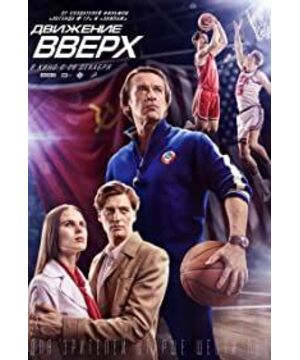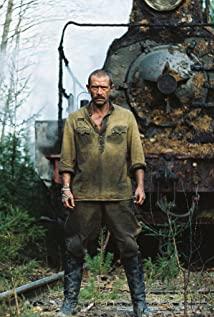June.
Looking for a good movie is like looking for a needle in a haystack in this June when theatrical films are crowded and tasteless at the same time.
Although commercial blockbusters and established IPs have been released together, I still want to firmly say that throughout June, my favorite is this niche movie.
Not one, but only one.
In 1971, the whole world was shrouded in the gloom of the Cold War between the East and the West for hegemony. Under the Iron Curtain, the contest between the two great powers, the United States and the Soviet Union, permeated every aspect, from the people to the high-level, from life to entertainment.
But in this year, the new coach of the Soviet basketball team, Garland, who was appointed in danger, "spoke wild words" at the press conference: Next year is the Munich Olympics, and we have to defeat the US team.
Sure enough, before the words fell, there was an uproar in the audience, public opinion fell into capitulation-style laughter, and the top government officials began to exert collective pressure.
Galanzhin naturally knew what his words meant.
At that time, basketball was called a "sport exclusively for Americans". Since 1936, the United States has won 36 consecutive years. No matter from which point of view, the chances of winning are not big.
Even the players themselves felt that defeating the U.S. team was a fool's errand:
The top star Sergey suffers from a knee injury, making it difficult to adapt to high-intensity games;
Sasha is terminally ill, and if he hits the ball again, he is afraid that he will have to catch his life;
Ivan has deep myopia and is in a trance as soon as he gets on the court;
Georgia had to attend her sister's wedding and was unable to train during that time.
Even some of the team members rebelled and wanted to welcome the embrace of capitalist countries while participating in the Olympics...
But it was such a seemingly powerless, scattered team that reached the finals in the Munich Olympics a year later, and once led the US team by 10 points.
The game was nearing the end, 50:49, and the U.S. team led by one point.
At the last minute, only 3 seconds left.
These fleeting 3 seconds, to complete a long cross-court pass and make sure the ball is thrown into the basket before the end of the game...
Two years ago, the release of "The Killing of Munich" in China not only triggered a crowded viewing craze among the Russian people, but also set a new box-office record for local films in Russian film history.
However, when the film was released in China, a full 13 minutes were cut.
The elimination of some important plots has led to obvious faults and abruptness in some bridges, and some plots are weak, which destroys the smoothness of the film and affects the viewing experience.
The 13-minute deletion is obviously not a compromise made for the policy reason of "force majeure". The most likely reason is the film's self-castration in order to win more films.
Putting aside the noise outside the movie, this game destined to be written into the history of world sports has two opposing controversies in itself.
The pros and cons are distinct.
In the last 3 seconds, the United States played 3 times. The United States felt insulted in this game, refused to admit the result, and even refused to receive the silver medal. So far, those silver medals are still on hold in the Swiss Olympic Museum.
This also means that the charm of this film is not only youthful blood, but also the assists of the times. The confrontation and support between the two have pushed the finale of the film to an unprecedented height.
The film spared no effort to restore the details of the entire game with the 1-hour movie time, and used costumes, props, performances, scenes, actions, and positions to rebuild the grand occasion of the game that year.
In particular, the restoration degree in the last 3 seconds can be called textbook level, and even the stumbling during the final layup lore has been re-enacted at a god level.
The filming took 3 years , and for the final final, all the actors had professional basketball training for up to 1 year .
Regardless of the cost, the entire team studied the live game of the year more than 300 times , revised the script 22 versions , and invested 7 machines in closed shooting for 30 days .
Burning is everyone's first impression of this movie.
It's a frenzy based on reality but beyond it.
In the fast rhythm, there are dizzying scene switching, and the composition, color, light, and shot scheduling work together. The MV-style art editing and slow-moving shots give a clichéd and fresh visual pleasure; the exciting and powerful soundtrack gives people Extreme congestion, almost bursting tension.
When these elements are arranged organically and appear on the big screen in a moderate manner, no matter how indifferent you are to basketball or the sports movies, it will make you feel a burning sense of participation.
The director Anton Megordichev made a game that was known to the truth, and made the blood boil; expressed the cruel competitive sports with humor and optimism; made the theme movie that originally belonged to sports fans very grounded, without Any obscure professional terminology, let alone a picture that requires a threshold to understand.
This is because, behind it, "The Killing of Munich" became the box-office champion. It is not simply the collective arrogance of the fighting nation, but the common emotion of all mankind, which is a universal value.
In this movie, you can not only see the cruelty and fun of competitive sports, but also the impermanence of fate, the suffering of life, the greatness of friendship, love and family, the eternity of sportsmanship, To the love and respect people have for basketball on the court…
You can see that Belov, who was sentenced by the doctor to not live for one year, suffered from repeated pain in the muscle collisions, but he ran desperately. When the crucial three seconds fell on his head, he Suddenly found: nothing is impossible, whether it is three seconds, or a year.
You can see that after winning that game, the players went back to the locker room, stacked the envelopes with the prize money, and handed it to the coach to treat his paralyzed son.
You can see that on the court, even the American audience who stood on the opposite side of the former Soviet Union could not help but be moved by the tenacity and tenacious spirit of the former Soviet Union players. .
At this moment, there is not so much confrontational nationalism, all the rivalry and inconsistency, all give way to the universal sportsmanship.
What is rare is that, as a main theme film, Russia did not blindly resort to narrow nationalism, but blackened itself in many aspects:
The strict scrutiny of the black customs, the blockade of the black country, the backward medical treatment of the black, the black trying to save the top government by withdrawing from the competition after the "Munich Massacre"...
But you can still smell the rush of hormones on the court, the heavy political climate, and the rich emotional mix.
For example, you can see some "sensitive" lines buried by the director: The American team will be defeated one day, and I think it is best to lose to us.
This sentence, in today's international environment, is very subtle, very meaningful, and worth pondering.
Two months ago, when I recommended "Fool in a Dangerous Building", I said that I have always liked Russian movies, whether it is "Leviathan", "Midsummer", or Ryazanov's "Trilogy of Sadness and Joy" …
They can be fierce or profound; they can be sensitive or touching; they can be direct or clean; they can be commercial or artistic; they can be fearless or gentle...
But they all have a unique temperament that is different from mainstream European and American films, and they are worthy of being seen and loved by more people.
But it can also be found that there are not many films in this "Lore to Munich" at present, and the box office is flat. It is also idiotic to want to wrestle with Hollywood's big productions at the box office.
From various dimensions and links, it is difficult to obtain the ideal box office: there is no big star, big production, big IP blessing;
There is no overwhelming announcement, and the name of the movie is unknown;
Sports themes that are difficult to be accepted by the market;
Russian films have no box office appeal in China…
But today's Chinese film market is no longer narrow, it is accepting excellent films from all over the world with greater tolerance and tolerance.
And this "Lore to Munich" from Russia is absolutely qualified to be respected and treated in China.
Anyway, it shouldn't be missed.
The article was first published on the public account: Yibei Movie
"author"
View more about Three Seconds reviews











